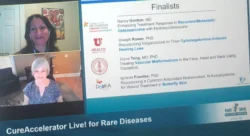
Press Release (ePRNews.com) - SKOKIE, Ill. - May 09, 2017 (UTC) - Cures Within Reach, the leading global nonprofit focused on repurposing research as a fast track to saving patient lives, will honor Drs. Berish Rubin and Sylvia Anderson, of Fordham University, at the 5th Annual Global Health Repurposing Awards (GHRA). Drs. Rubin and Anderson will receive the 2017 Janet Davison Rowley Patient Impact Research Award for their development of a multi-nutraceutical treatment regimen for patients with Familial Dysautonomia, a rare genetic disorder. The research team will be presented with their award on June 27, 2017 at the Radisson Blu Aqua Hotel in Chicago, IL.
Drs. Rubin and Anderson jointly direct the Laboratory for Familial Dysautonomia (FD) Research at Fordham University. In 2001 they first discovered the gene mutation for Familial Dysautonomia (FD), a rare disorder that impacts the development and function of the autonomic nervous system in affected individuals, due to loss of a functional protein. Patients with FD suffer from a variety of symptoms that include loss of body temperature regulation, blood pressure swings, vomiting crises, cardiovascular instability and lack of overflow tears. Drs. Rubin and Anderson were able to restore the functional protein and significantly reduce or eliminate symptoms in FD patients by repurposing several nutraceuticals: two bioactive agents from soy, plus derivatives of Vitamin A and E, and the compound EGCG, which is a bioactive agent found in green tea. Their repurposing research has been published in the numerous journals, including Molecular Nutrition & Food Research. Since their findings were published, FD patients on the regimen have been able to lead almost normal lives with functioning nervous systems through the nutraceutical combination and dietary changes.
“Cures Within Reach is thrilled to recognize Drs. Rubin and Anderson,” noted GHRA Co-Chair Stephen C. Groft, Pharm.D., Senior Advisor to the Director, NCATS, NIH. “We were impressed to see how this research team was able to repurpose nutraceuticals that can not only improve the lives of children born with FD, but that can also lessen the impact of the FD mutation when a woman carrying a child with this genetic mutation takes the nutraceutical combination during pregnancy. This discovery is a huge win for FD patients and the scientific community, because it underscores how effective repurposed treatments can be.”
The rare disease focus at their year’s GHRA commemorates Cures Within Reach’s first repurposing success, which found that the drug sirolimus created a life-saving treatment for a rare disease called autoimmune lymphoproliferative syndrome. The four Global Health Repurposing Awards that will be presented their year at the GHRA will honor leaders in business, science, medicine and philanthropy. The awardees’ achievements have made a difference in patients’ lives through repurposing research that finds new uses for existing drugs, devices and nutraceuticals.
“We are honored to receive the 2017 Janet Davison Rowley Patient Impact Research Award and to be added to an impressive list of researchers and clinicians,” Drs. Rubin and Anderson remarked. “We will continue exploring repurposed treatments in order to improve as many rare disease patients’ lives as possible.”
The Janet Davison Rowley Patient Impact Research Award, recognizes researchers or clinicians who have: successfully repurposed a drug, device or nutraceutical for human clinical use; published their repurposed treatment results in the clinical or scientific literature; and provided patients with increased quality of life through the repurposed treatment developed. Previous awardees include Dr. Marty St. Clair, Viiv Healthcare; Dr. Vincent Rajkumar, Mayo Clinic; Drs. James Surmeier and Tanya Simuni, Northwestern University; and Dr. David Teachey, Children’s Hospital of Philadelphia.
To attend the 2017 GHRA and honor all awardees, visit http://www.cureswithinreach.org/ghra-2017
ABOUT CURES WITHIN REACH
Cures Within Reach (http://www.cureswithinreach.org) works to catalyze repurposing research to quickly and affordably improve patient lives. We accomplish this by connecting funders with researchers to jumpstart repurposing research clinical trials, by providing collaboration tools so repurposing stakeholders can work together more easily, and by pioneering alternative finance engines and incentives for repurposing research. Cures Within Reach’s repurposing research projects have generated over a dozen “new” treatments making patient impact through off-label use in clinical practice or through a commercialization track. Cures Within Reach currently has 24 repurposing research projects either funded or approved for funding. Visit us at www.cureswithinreach.org or follow us via Twitter @CuresWReach, LinkedIn.com/company/cures-within-reach, YouTube.com/cureswithinreach or Facebook.com/CuresWithinReach.
ABOUT CUREACCELERATOR™
Cures Within Reach built CureAccelerator (www.cureaccelerator.org) to provide a global collaboration space and marketplace for repurposing research that can deliver effective solutions to unsolved diseases. The CureAccelerator platform was built with a grant from the Robert Wood Johnson Foundation, to provide a platform in which drugs, devices and nutraceuticals approved for one or more human diseases can be repurposed to create “new” treatments in other diseases. CureAccelerator has over 1,000 users who have proposed 120 projects, of which more than 20 have received funding and are moving towards patient impact.
ABOUT THE FD LAB AT FORDHAM UNIVERSITY
The FD Lab at Fordham University currently focuses on the molecular biology of Familial Dysautonomia (FD). FD, also known as Riley-Day Syndrome or hereditary sensory neuropathy Type III, is an autosomal recessive disorder that affects the development and survival of sensory, sympathetic and some parasympathetic neurons. Individuals with FD are affected with a variety of symptoms which include decreased sensitivity to pain and temperature, cardiovascular instability, recurrent pneumonias, vomiting crises, blood pressure swings, an absence of overflow tears and gastrointestinal dysfunction. This disorder is primarily confined to individuals of Ashkenazi Jewish descent. Studies underway in the laboratory are aimed at continuing to identify compounds that will increase the amount of functional IKAP produced in individuals with FD and to understand the role IKAP plays in the pathophysiology of FD.
Source : Cures Within Reach




